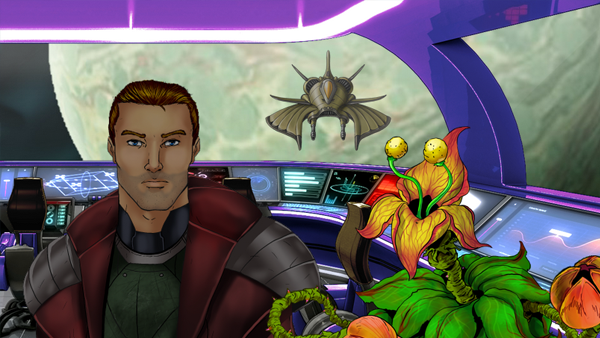Professional musician and composer, Andy Mitchell has spent 7 years writing missions and game books for his tabletop RPG, Solar Echoes. Now, the one-man team at CoreFun Studios is taking inspiration from the exciting sci-fi universe of Solar Echoes and translating it into a visual novel prequel for PC (& possibly consoles) under the title; The Star Legation.
We recently spoke to Mr. Mitchell about the development of TSL, its Kickstarter campaign, and some of the things that inspire him as a writer.
Here’s what Andy had to say.
Tell us about yourself and your entry into video game development.
I became passionate about writing, music, movies, and gaming all around the same time when I was a kid. I started playing both tabletop RPG’s and video games back in the 80’s and have been playing them ever since.
I’ve always loved writing stories and decided to try writing my own tabletop RPG, Solar Echoes, which I self-published in 2012.
Even though I spent the next 7 years writing Solar Echoes missions and game books, I kept thinking about how much I’d love to turn those ideas into a video game.
I consider The Star Legation the perfect chance to bring together the 4 things I’m passionate about {all} into one project.
Tell us about The Star Legation.
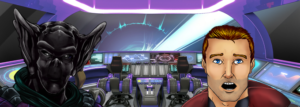
The Star Legation is a choice-driven visual novel with cinematic and RPG elements.
The story of The Star Legation is actually a pre-history to the Solar Echoes universe, at a time when the alien races are just beginning to discover each other.
Some begin to trade while others become locked in deadly interstellar wars.
You, as the protagonist, Trey, are selected to represent the humans and journey with other allied aliens into hostile territories to negotiate with leaders on their homeworlds and convince them to send a representative with you.
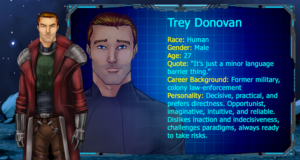
The goal is to form the Interstellar Union, where all alien races are represented in the alliance.
The game involves relationships among your alien crew, as you need to make sure everyone gets along and survives to the end of the journey. Trey also has romantic options with the two human females he reports to, long-distance.
Why did you decide that a visual novel would be the best genre for The Star Legation video game?
In a way, it was a happy accident.
A few years ago, I decided to make a short animated movie to share the Solar Echoes universe on YouTube.
I wrote a short script, gathered a few friends and artists that I’ve worked with to voice-act the parts, and then drew from my experience in film to edit and animate a 15-minute movie.
I included subtitles for all the lines, and when the project was finished, I took a step back and thought, “Hey, this is kind of like a visual novel!”
I’d never dreamed that I could make my own video game because I didn’t know how to write code. But, I found a program called TyranoBuilder that makes the process easy with modular tools.
It was the perfect fit for someone with my limited programming experience. All of that gave me the courage to try making a visual novel.
What have been some of the challenges of converting your sci-fi universe from a tabletop platform to a video game?
The challenges have been similar to running a tabletop RPG game with players.
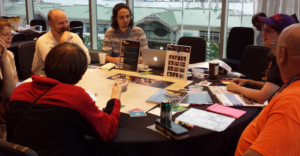
Since I’ve been storytelling as a GM in tabletop RPG’s most of my life, bringing the Solar Echoes universe to a video game was like writing a new adventure. As I wrote, I imagined the story I wanted to tell, and then pretended to be each of the characters as if I was role-playing in my own game.
The biggest challenge was staying wary the entire time of the intended story I wanted to tell without allowing the characters to go off too far on a tangent, because that would ultimately mean more development time and artwork, which is really expensive.
That being said, I must admit that there are two instances in the game that ballooned into pretty big alternate paths because I liked the ideas so much and wanted players to experience them, if they chose those pathways.
Those areas resulted in over a month of extra writing and 5 extra pieces of art I hadn’t originally planned on.
You describe yourself as someone who’s written and told stories most of your life. Where do you go / what do you do to get inspired to write?
I read, play a lot of video games, and watch a lot of movies for inspiration.
By exposing myself to the talented creations of other writers, my mind starts churning with my own ideas.
Sometimes I’ll stop a movie or game and pull out my phone to send myself an email, noting a concept or technique that was used that I liked.
Later, I’ll refer to that and think about it on my way to work during my long commute. Basically, the creativity of others jumpstarts my brain when it’s devoid of ideas.
You wrote a 900-page script over 13 months for The Star Legation. Can you tell us about the process you went through to accomplish that daunting task?
Since I’m a musician, I have a bit of an odd schedule and work from early afternoon until late at night. That leaves my mornings free. So, every morning, I’d get up, eat breakfast, and sit down in front of my computer to write.
During those 13 months, I’d write nonstop for about 4 or 5 hours on weekdays, and then get ready for work.
During my commute, I’d keep my smartphone ready to record any additional ideas I had, and then reference those during my next writing session.
Once I’d finish a scene, I’d go back over it and rewrite.
About once a week, I’d read through everything from the beginning and make more adjustments. It was an ongoing editing and writing process.
Tell us about your music background and how the soundtrack for the game came about.
I’m a solo guitarist with a BM and MM from the Peabody Conservatory of Music, which is part of the Johns Hopkins University.
I took a few classes in Creative Writing at Hopkins, but my degree focus was music.
While I was there (even though I was studying to be a guitarist) I became increasingly interested in composing, and was able to squeeze in a semester of composition.
After I graduated, I continued writing for guitar. I spent 7 years performing concerts through an agent, {but} eventually decided to stop playing concerts and refocus on composing.
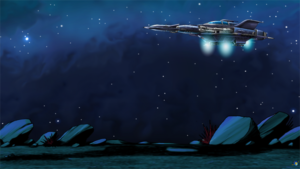
When I began writing The Star Legation, I imagined some of my compositions for a few of the scenes, and decided to try changing the instrumentation from guitar to synthesized, sci-fi sounds.
It actually fit really well.
I then began writing more sci-fi pieces on guitar and converting them with a Digital Audio Workstation (DAW) for the game.
The opening theme of the game is the only piece I wrote that has a natural instrument; the violin. Everything else uses electronic music. (On a side note, my daughter is the violinist playing the opening theme music).
In TSL, you have two choices of game modes. What’s the difference in the Optional versus Challenge mode?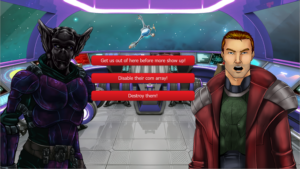
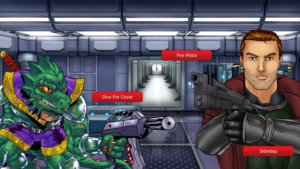
At the beginning of the game (not in the current demo), you’ll be asked to decide if you want to play Optional mode or Challenge mode.
Optional means that if your choices in the game lead to a combat encounter, you’ll be given the chance to skip and auto-win that combat section, or you can decide to play through it.
If you choose Challenge mode, however, you cannot skip the combat and must play through the scene. If you solve the game in Challenge mode, there will be an extra achievement you can earn, and possibly another surprise!
How important will choices be in the game?
About 85% of the choices you make in the game will have an impact on what happens in the end. The other 15% either open up extra background information or add slightly different routes that quickly rejoin the main route.
The majority of the choices you make are about relationships, whether you’re talking with your alien crewmates, the two human female liasons, or the alien leaders.
The most immediate effects of your choices will be noticed when you’re talking with the alien leaders.
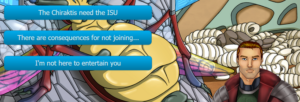
Deciding when to be witty, conciliatory, aggressive, or even humorous will have a big impact on how they respond to you. They might become more agreeable or hostile as you speak with them, depending on the choices you make.
When talking with your crew, your choices will involve lots of hidden variables that determine your overall reputation with each of the crew members. This will all be tested near the end of the game, and your relationship with your crew will have a big impact on the final events.
{For example}, when talking with the human women, you can choose to stay entirely professional, and the hidden variables won’t matter much.
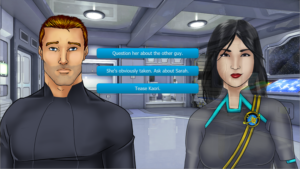
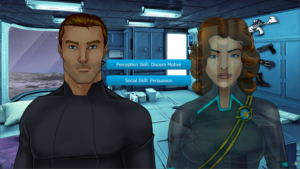
However, if you decide to pursue one (or both!) of the women romantically, the variables will determine your relationship with them. If you survive to the end of the game, the endings will reflect your relationships with the women.
You have a demo available right now on Itch.io. What can players do in the demo?
The demo involves the first 40 minutes of the game, right from the beginning.
Trey’s initial mission assignment is given. 3 of the 8 other main characters will be encountered as he journeys from his planet to the homeworld of the plantlike Erwani people.
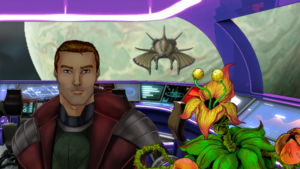
Players can select Trey’s skills, his combat preference (firearms or martial arts), and will be able to make a number of choices before the demo ends.
I’d recommend choosing Cybertech, Awareness, and Discern Motive for Trey’s skills in the demo, since these skills will be involved in a few of the choice options. (The other skills are involved in later parts of the game, beyond the demo).
I made sure all skills are equally represented through the entire game, but the three I recommended are used in the first 40 minutes.
You’re currently looking for funding on Kickstarter. Can you tell us what some of your big goals are for the campaign?
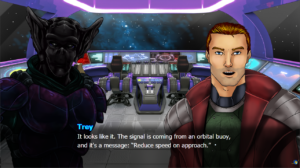
My first goal is to fund the full development of the game.
Although I’m self-publishing through my single owner company, CoreFun Studios, I’ve financed everything myself so far, and the costs for making this game are high.
If I should reach the funding goal despite the economic uncertainty we’re seeing during this pandemic, I have five stretch goals:
- Write an even bigger soundtrack with more compositions
- Commision 10 more CG’s by the talented artist, Aeghite
- Enhance the intimacy of all conversations with the 2 human female characters (by funding full voice acting for Sarah and Kaori in their private conversations with Trey)
- Fund a programmer skilled in Unity to convert the code so I can bring the game to consoles
- Fully fund voice acting for all characters in the game
You’re planning a release on PC and possibly mobile. Any plans for a console release down the road?
Yes, I definitely hope to bring this game to consoles.
My personal favorite console is Sony’s PS Vita, which is especially known for its many RPG’s and visual novels.
I do need to hire a Unity programmer to convert the code to do this, but if I can’t afford it, I intend to teach myself to use Unity. I imagine that endeavor will require a few years to complete on my own, though.
If The Star Legation proves successful, will you continue the visual novel series? Will you be continuing the Solar Echoes series?
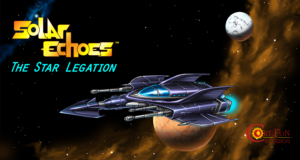
I suppose that really does depend on how successful it is, but it also depends a little on my capabilities in the future.
I would love to bring the strategy gaming elements of the Solar Echoes tabletop RPG over to video games, but my priority is always the story and the characters.
If people like The Star Legation and want more visual novels, I might do more. I do plan to continue expanding the Solar Echoes series in as many ways as possible.
What’s next for you/ CoreFun Studios?
I’ve written a full novel that takes place in the Solar Echoes universe, and I intend to self-publish it on Amazon, hopefully this year.
My ultimate dream is to make a full movie for Solar Echoes, and I’d also love to bring the game to VR.
I have a huge list of books I’d like to write for the Solar Echoes TTRPG as well. If the interest in this universe continues and the fans grow, I’ll keep producing as much content as I can, and grow this company so I can produce it faster with better quality than I can manage on my own.
What’s your best piece of advice for fellow indie developers working on their first video game?
Trust your vision. There will always be a few who don’t share it, but keep working tirelessly to make it happen.
If you start doubting yourself, remember the enthusiasm and support of your fans. That can sometimes be the very best fuel to keep things going.
End Interview
Thanks so much to Andy Mitchell for taking the time to talk to us. We look forward to the release of The Star Legation!
If you’d like to support this fun for all ages sci-fi visual novel, you can do so by giving to The Star Legation Kickstarter campaign, running now through April 18th.
Try the demo of TSL via Itch.io.
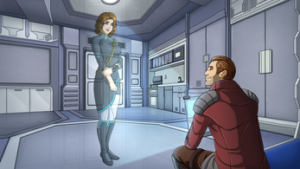
See a trailer for TSL on the CoreFun Studios YT channel.
Read more about the title on the game’s official website.
Find out more about the tabletop game, Solar Echoes, here and here.
Keep up with the latest CoreFun Studios/Solar Echoes news through Twitter and Facebook.

